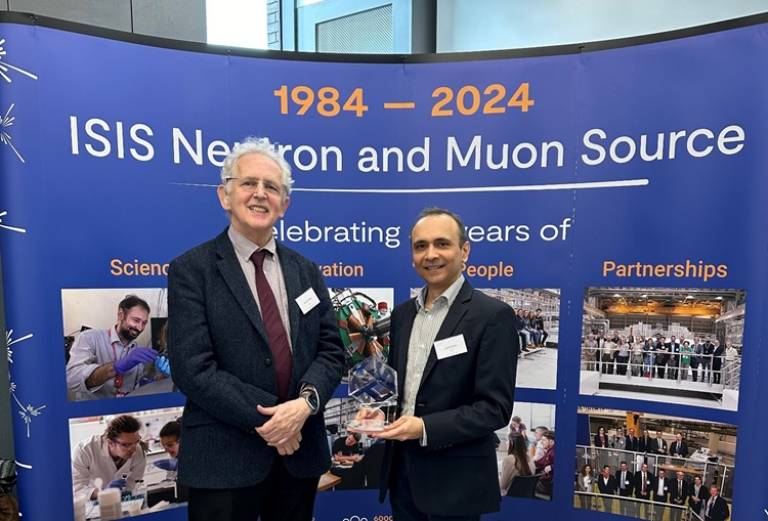ISIS Impact Award – understanding therapeutic antibodies
7 May 2024
Professor Steve Perkins (Division of Biosciences) and Dr Jayesh Bhatt (Department of Physics & Astronomy) have received the Society Impact Award 2024 from ISIS, STFC (UKRI).

The Impact Award from the UK’s ISIS neutron facility has been given for determining the molecular structures of therapeutically-important antibodies in solution by a combination of neutron and X-ray scattering and computational modelling. Therapeutic antibodies are used to treat conditions ranging from allergies to rheumatoid arthritis and several types of cancer, and these account for a drugs market of around $100 billion worldwide.
Determining the detailed structure of antibody molecules under physiologically relevant conditions is a key step towards understanding antibodies. While ‘frozen’ snapshots of antibodies can be obtained using protein crystallography, determination of their structures in solution, where these very large and flexible molecules are not confined to a fixed shape, remains a major challenge.
Professor Perkins and Dr Bhatt developed a novel methodology, where they combined neutron scattering and X-ray scattering data with computer simulations and artificial intelligence techniques to obtain unique ensembles of antibody structures with atomistic detail that also captured details of the molecules’ flexibility in solution. In humans, immunoglobulin G (IgG) is the most common type of antibody found in blood circulation that neutralises pathogens. There are four subclasses of IgG, named IgG1, IgG2, IgG3 and IgG4.
Using this novel technique, solution structures for each of the four IgG subclasses were determined to show how all four complement each other in providing a comprehensive immune response. The method is even powerful enough to describe the molecular changes that take place when the sugar chains were removed in IgG1 and IgG4, thus opening the way for alternative and cheaper manufacturing platforms in bacterial and cell-free systems. Most recently, the method was used to analyse the solution structure of a C5-Fc nanobody which binds to and neutralises the COVID-19 virus coat protein. The method is wide ranging in its scope, being applicable to other molecular structures such as immunoglobulin A, the widespread collagen molecules, and complement Factor H important in kidney failure.
This work has led to collaboration with several research organisations and industrial partners. Professor Perkins and Dr Bhatt have delivered training courses on their technique in the UK and abroad. Professor Perkins said: "These modelling calculations enable us to extract the fullest benefit from neutron and X-ray scattering experiments, and is applicable to all types of exciting biological and medical systems to enable further research. We're hoping that the antibody industry can use our approach to develop even more useful therapies and antibody tests”.
Further Information
- Press release from ISI Neutro and Muon Source site
- Molecular IgG3 structure paves the way for new applications of antibodies - (2021 paper)
- Professor Stephen Perkins profile
- Dr Jayesh Bhatt profile
- UCL Division of Biosciences
- UCL Department of Physics and Astronomy
- Research Department of Structural and Molecular Biology
Image
Professor Steve Perkins and Dr Jayesh Bhatt are holding their ISIS Society Impact Award awarded at the UK Neutron and Muon Science and User meeting at the Warwick Conference Centre, Coventry, April 2024.
 Close
Close

